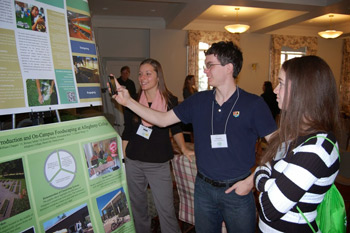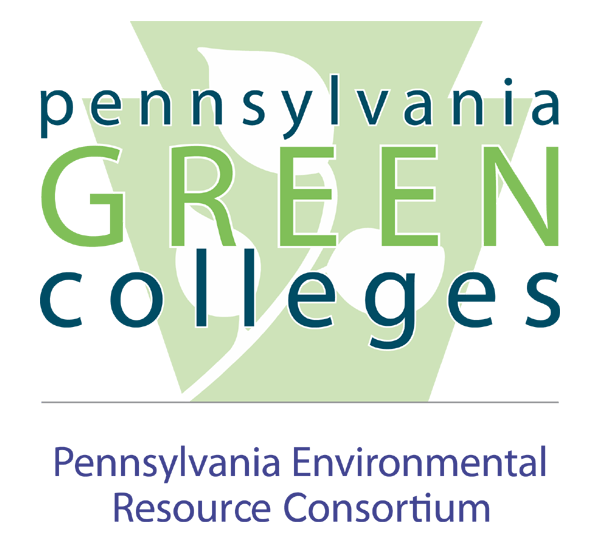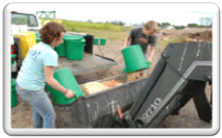Poster Session Submissions
PERC Fall Conference
October 9th, 2015

Sorted alphabetically by Lead Author’s last name
Project Title: MARC Community Garden
Institution: Allegheny College
Lead Author: Rebecca Anderson
Other Contributors: Keri Tucker
The Community Wellness Initiative, a collaboration between Allegheny College and several other organizations in Meadville, have partnered to build a community garden at the Meadville Area Recreation Complex.
Project Title: Nitrogen Footprint
Institution: Dickinson College
Lead Author: Steven Fitzpatrick
Other Contributors: Neil Leary, Director of the Dickinson College Center for Sustainability Education. Nitrogen Footprint Project Leader for Dickinson College; Marcus Welker, Projects Coordinator at the Dickinson College Center for Sustainability Education. Reader of the Abstract
Nitrogen can pollute the environment and be harmful to human health, when taken out of its stable state. The Dickinson College Center for Sustainability Education is currently working with the N-Print Team, an international team of scientists that has built a program to capture virtual nitrogen, on its second nitrogen footprint study. We are collecting data on the amount of nitrogen produced through the College’s procurement practices, including food purchase data, waste water treatment, and utilities. We are refining our data collection and analysis techniques to produce more effective nitrogen pollution mitigation strategies on campus, including changes in campus-wide procurement practices and individual’s behaviors.
Project Title: West Chester University Student Sustainability Survey
Institution: West Chester University
Lead Author: Joy Fritschle
Other Contributors: Lynn Monahan, Ashlie Delshad, Paige Minka
Since 2006, more than 600 colleges and universities including West Chester University (WCU) have pledged to become carbon neutral through the American College and University Presidents’ Climate Commitment (ACUPCC). To help us fulfill our commitment, we administered a survey to WCU students to collect data on the behaviors, beliefs or attitudes of students on sustainability issues and topics. We found that most students believe it is important to eat organically-produced food, use alternative transportation methods, and to conserve natural resources, energy, and materials. One-quarter of students surveyed expressed interest in pursuing a degree program (major or minor) in sustainability if it were available at WCU.
Project Title: Allegheny College Bike Share
Institution: Allegheny College
Lead Author: Bennett Gould
Other Contributors: Isaac Pallant, Kelly Boulton
This poster will explore the development of the Allegheny College Bike Share program, failures along the way, and recent successes in institutionalizing the program as an officially recognized student organization that collaborates with the library to manage check-out. We will explore logistical needs (tools, workspace, storage, locks), mechanics, use from the student perspective, necessary next steps to ensure longevity and institutional integration, and community engagement measures such as maintenance workshops, community rides, and pedal-powered blenders. Future steps such as electric assist bikes powered by renewable energy and a more sheltered fleet station will also be explored.
Project Title: Reducing Campus Electricity through Cooperation and Fun
Institution: Allegheny College
Lead Author: Bennett Gould
Other Contributors: Kelly Boulton, Eric Pallant, Beth Choate, Casey Wilson, Ian Carbone
From 2010 - 2014 Allegheny College ran four-week energy challenges. Electricity consumption was measured and compared to a baseline year of 2008. An alternate baseline, more granular data for 20 sub-metered buildings, and historic utility bill consumption trends were further analyzed to identify any persisting change and understand the impact of behavior change separate from efficiency retrofits, changes in population, and normal seasonal shifts.
Consumption trends changed in the years during challenge implementation compared to the years before engaging the campus community. All analyses reinforce that the challenge reduces electricity consumption. However results must be analyzed in multiple ways to isolate for behavior change.
Project Title: Diversity and Abundance of Native Bees on a Land-use Gradient in Meadville, PA
Institution: Allegheny College
Lead Author: Paige Hickman
Other Contributors: Erica Moretti & Advisor Beth Choate
We investigated the diversity and abundance of native bees with regard to land-use at various sites in Meadville, PA. Land-use can be defined as the ratio of permeable and impermeable surfaces along with the presence or absence of green space and floral diversity. We estimated percentages of types of land at each of our sites, and we also examined floral diversity and bloom abundance to see if these variables affected our findings. Ultimately, we found that there was greater native bee abundance and genera richness in areas where the landscape was less manipulated.
Project Title: Lycoming College Environmental Audit, Sixth Edition
Institution: Lycoming College
Lead Author: Julian Jones
Other Contributors: Johanna Hripto, Dr. Mel Zimmerman , Dean Dan Miller, Dr. Sharon Trachte
The first environmental audit for Lycoming College which documented energy, water, solid waste and recyclable materials was completed in 2008 by students of the newly formed sustainability committee. Since then, an audit has expanded and documented all aspects of sustainability on the Lycoming College campus. The sixth edition is the most comprehensive audit to date and summarizes the recently established To-Go program in the Dining Hall, the Food Recovery Network, Recyclemania, TerraCycle and E-Waste, in addition to other initiatives on the Lycoming College campus.
Project Title: "Composting and food diversion: bridging the great divide"
Institution: Penn State University
Lead Author: Judd Michael
Other Contributors: Maryam Shahri
Zero waste is an important sustainability topic for organizations ranging from universities to foodservice retailers. It is clear, however, that achieving zero waste will be nearly impossible without a means to manage biomass (especially food waste) in addition to recyclables. The entire supply chain must be considered, which we believe includes not only procurement but also human behavior and ultimate end-of-life disposal.
This poster would detail ways to overcome the gap between zero waste opportunities and current human understanding of composting (be it consumers, foodservice operators, etc.). Our case studies are based on work at university and professional athletic events seeking to become more sustainable. Based on initial insight mining conducted at Penn State, follow-up intercepts at sports events, and quantitative surveys with more than 1,500 students, we found that the topic of composting vis-à-vis food and food packaging is very unclear and often misunderstood. We illustrate ways to use education and communication strategies to manage the divide and ultimately decrease food waste placed in landfills.
Project Title: Basking in the sun: Can solar power work for the municipality of Meadville PA?
Institution: Allegheny College
Lead Author: Isaac Pallant
Other Contributors: Dan Conant, Laura Nagel, Christopher Soff, Andy Walker & Richard D. Bowden
This project addresses the feasibility of photovoltaic (PV) use for the municipality of Meadville, PA. We will identity city- and county-owned properties suitable for PV arrays and assess the efficacy of different solar panels. We will then use available software to calculate solar energy potential, and energy generation and economic viability. Comparing potential solar energy input with city energy bills will help determine the economic feasibility of this project including up-front costs, payback times, and financing options.
Project Title: The Carbon Athletic Conference
Institution: Allegheny College
Lead Author: Stuart Sadie
Other Contributors: Richard D. Bowden
Assessment of the economic, environmental, and social costs of the Allegheny College softball team travel schedule. For the softball team alone, development of a more locally-based, less travel-intensive athletic conference would reduce fuel and related emissions by 66%, reduce CO2 emissions by 20 MT, and save each student 35 hours/ year in travel time. Economically, savings accrued would amount to $8,000 per year. Only 35% of athletes, and 25% of coaches at Allegheny expressed a strong preference for remaining in the current conference.
Project Title: Sustainable Forest Management: Identification and Prioritization of Forest Landowners in NWPA in Support of Targeted Outreach Program
Institution: Allegheny College
Lead Author: Christopher Shaffer
Other Contributors:
The Foundation for Sustainable Forests (FFSF) is a non-profit land trust and education and advocacy organization dedicated to protecting the working forests of Pennsylvania, New York, and beyond. Through direct ownership and active management of timberland, the FFSF practices and promotes the stewardship of local forests (FFSF, 2014). A short-term goal of the foundation is to identify forest landowners within the region to gauge interest in establishing partnerships (i.e. purchase or lease timberland) or simply provide them with information regarding sustainable management practices. As part of this initiative, the foundation applied for several grants to support the design and production of a database of forest landowners and the costs associated with a targeted mailing campaign. Based on the “spatial” nature of the criteria used to identify and prioritize landowners, a geographic information system (GIS) was used to analyze the data. The criteria for forest land included: >= 25 acres of contiguous forest particularly circular or rectangular in shape, existing entirely or partially within the French Creek drainage basin, in close proximity to existing FFSF managed land protected lands (federal, state, county, and non-profit), high-value ecosystems as defined by the Western Pennsylvania Conservancy (WPC) Natural Heritage Program, and important bird area (IBA) forest blocks as defined by the Pennsylvania Audubon Society, appropriate landuse designations, and parcels owned by individuals not residing on or in close proximity to the timberland. The results of the spatial analysis showed that of the 238,874 individual parcels of land within Crawford, Erie, Venango, and Warren counties in Pennsylvania, about 6,736 or 4.83% of parcels met all of the criteria defined. Each criterion was then ranked on a scale of 0 (lowest priority) to 5 (highest priority) and combined using both equal and unequal weighted approaches to produce a cumulative score for each parcel. For example, in Crawford County the maximum score any parcel received was 34 out of a possible 35, the lowest value was 4, and the mean was 16. In contrast, the maximum, minimum, and mean values for the unequal weighted analysis for the same county were 4.2, 0.5, and 1.79 respectively. Using the results of these analyzes, the foundation is able to perform various “sorts” on the data in order to prioritize forest landowners for different types of mailings.
Project Title: Mediation of Environmental and Public Conflicts
Institution: Penn State Institutes of Energy and the Environment
Lead Author: Xiaoxin Shi
Other Contributors: Lara Fowler, Elyzabeth Engle
As part of the Sustainable Communities Collaborative partnership with Penn State’s Sustainability Institute, students in a Fall 2014 Penn State Law course entitled “Mediation of Environmental and Public Conflicts” took part in a unique engaged scholarship opportunity by conducting a situation assessment on stormwater. They researched stormwater management in general, explored the process for addressing stormwater issues through a series of in-class role plays, facilitated discussion sessions at the Centre County Watershed Summit, and interviewed several stakeholders.
Project Title: Susquehanna University's Community Food Action Team
Institution: Susquehanna University
Lead Author: Natalie Siedhof
My name is Natalie Siedhof and I am the AmeriCorps PACC*VISTA/ Food Justice Coordinator working on the Susquehanna University campus for the 2015 / 2016 term. My role on SU’s campus is to create a sustainable program that is completely student run - serving to promote food justice and healthy food systems in both the SU and Selinsgrove community. This poster will highlight the accomplishments we have made thus far: success of the Campus Garden, creation of the Community Food Action Team student group, our work with the Food Recovery Network, and programming we have implemented on campus/ in the community.
Project Title: How Green Can Keystone Be?
Institution: Keystone College
Lead Author: Jessica Surace
Other Contributors: Mr. Michael Lusk
Keystone College is a small college in La Plume, Pennsylvania with big goals to be as green as we can be. Keystone believes in doing several small, but important projects to have beneficial result. We believe in local products from over 40 different farms, being eco-friendly with cleaning products, local fair trade coffee, and proper waste reduction with ORCA. Come by to see more of how green Keystone College can be!
Project Title: The Wonder of Bread
Institution: Allegheny College
Lead Author: Sarah Swartz
Other Contributors: Eric Pallant, Kerstin Martin
Our ancestors baked bread for six millennium, yet the average university student only knows that bread comes either packaged in a circus-colored plastic bag or arrives by car in the middle of the night bearing tomato sauce, mozzarella, and pepperoni. Over the summer of 2015, students and professors partook in the process of transforming organic wheat grown in the Allegheny College garden into bread made of only four ingredients: freshly ground whole wheat, water, a little bit of salt, and a century old sourdough starter. This project documented the process of harvesting, threshing, winnowing, milling, baking, and enjoying.
Project Title: Dickinson College Water Footprint
Institution: Dickinson College
Lead Author: Nicola Tynan
Other Contributors: Faculty Advisor: Nicola Tynan. Student Researcher: Ziwei Zhu (Sophia). Presenter: Ziwei Zhu (Sophia) & Yuanxiaoyue Yang (Artemis)
The Dickinson College Water Footprint Project aims at providing a detailed analysis of water use from 2006 to 2015 at Dickinson College. From an examination of both the water use data (in cubic foot) and water cost data collected from the Dickinson Facilities Management System, we identified the trends of water use in different types of buildings across time and the financial sustainability of water use around Dickinson campus. We hope to use this analysis to strengthen our understanding of Dickinson’s current water conservation progress and further improve our campus sustainability programs.
Project Title: Composting Conundrum: Evaluating Food Waste and the Effectiveness of Compost on College Campuses
Institution: Allegheny College
Lead Author: Gavrielle WinerOther Contributors: Carissa Lange, Elia Sherman Jonah Raether, Brittany Davis, and Benjamin Haywood
Food waste results in approximately 3.3 billion tons of CO2 emissions every year. Allegheny College, an institution that is committed to sustainability, participates actively in composting as a means to reduce those emissions. While food scraps and most paper and plastic products on campus are compostable, improper disposal remains an issue. Through the use of measurements, observations, and interviews, this research revealed that 94.05% of the items in the trash and 36.33% of the items in the recycling in campus dining halls could have been composted. Results suggest that waste disposal processes could be improved at Allegheny.



